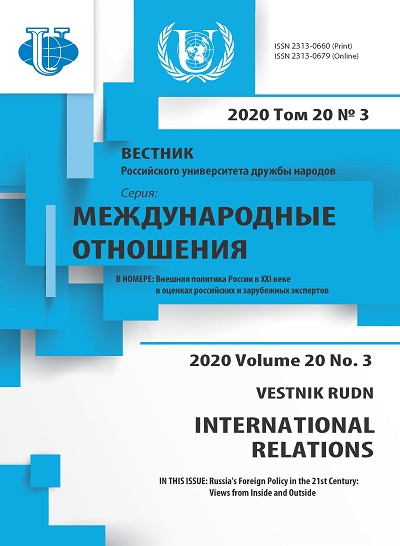Russia’s Strategies towards BRICS: Problems and Opportunities
- 作者: Sergunin A.A.1,2
-
隶属关系:
- MGIMO University
- St. Petersburg State University
- 期: 卷 20, 编号 3 (2020): Russia’s Foreign Policy in the 21st Century: Views from Inside and Outside
- 页面: 534-542
- 栏目: THEMATIC DOSSIER
- URL: https://journals.rudn.ru/international-relations/article/view/24626
- DOI: https://doi.org/10.22363/2313-0660-2020-20-3-534-542
如何引用文章
全文:
详细
This article aims to examine Moscow’s policy motives regarding BRICS as well as priority areas in Russia’s strategy towards this grouping. The Russian policies towards and within BRICS represent a combination of ideational and material motives. On the one hand, BRICS is important for the Kremlin in terms of status seeking: with the BRICS’ help Russia tries to return its status of a great power, shape the future world order and to make the West abide by the rules of that order. On the other hand, Moscow values its economic and strategic partnerships with the BRICS states which are important for Russia’s well-being and for counter-balancing the West in the global geopolitical and geoeconomic game. In other words, BRICS provides Russia with additional prestige in the international arena as well as greater legitimacy to its international activities. In contrast to the West’s accusations, in case of BRICS Russia’s foreign policy behavior does not fall into the category of the revisionist one. Rather, Russia (similar to other BRICS countries) prefers to act on the basis of existing international rules and norms rather than to challenge or keep them intact. Russia aims at reforming these rules to adapt them to new global realities and make them acceptable for all the members of the world community.
作者简介
Aleksandr Sergunin
MGIMO University; St. Petersburg State University
Email: sergunin60@mail.ru
PhD, Dr. of Sc. (Political Science), Professor, Department of World Politics, MGIMO University; Professor, Department of Theory and History of International Relations, St. Petersburg State University Moscow, Russian Federation; Saint-Petersburg, Russian Federation
参考
- Bratersky, M. & Kutyrev, G. (2019). BRICS and the Evolving Russia - India - China Security Agenda. Strategic Analysis, 43 (6), 597-619. doi: 10.1080/09700161.2019.1673617
- Chernova, V., Degtereva, E. & Zobov, A. (2016). Scientific-Industrial and Economic Cooperation between Russia and BRICS States: Proposal of Effective Forms and Mechanism. The Journal of Comparative Asian Development, 15 (3), 333-360. doi: 10.1080/15339114.2016.1249896
- Cohen, A. & Hamilton, R.E. (2011). The Russian Military and the Georgia War: Lessons and Implications. Carlisle Barracks: Strategic Studies Institute.
- Fulquet, G. (Eds.). (2015). The Rise and Fall of International Powers: An Assessment of the BRICS. Buenos Aires: FLACSO.
- Hansen, F.S. & Sergunin, A. (2014). Russia, BRICS, and Peaceful Coexistence: Between Idealism and Instrumentalism. In: De Coning, C., Mandrup, T. & Odgaard, L. (Eds.). The BRICS and Coexistence: An Alternative Vision of World Order. Abingdon: Routledge. P. 75-99. doi: 10.4324/9781315766171
- Lagutina, M. & Leksyutina, Y. (2019). BRICS Countries’ Strategies in the Arctic and the Prospects for Consolidated BRICS Agenda in the Arctic. The Polar Journal, 9 (1), 45-63. doi: 10.1080/2154896X.2019. 1618559
- Leksyutina, Y. (2015). BRICS: Reforming Global Economic Governance System. Public Administration and Civil Service, 1, 166-172. URL: https://journal.apa.kz/images/books/1-2015/index.html (accessed: 12.03.2020)
- Leksyutina, Y. (2017). Leadership in BRICS: Forecasts and Realities. Russian Politics & Law, 55 (6), 419-435. doi: 10.1080/10611940.2017.1574500
- Leksyutina, Y. (2018). Functional Changes in China’s Participation in the Multilateral Development Banks: From Borrower to Creditor Status. International Organizations Research Journal, 13 (1), 80-98. DOI: 10.17323/ 1996-7845-2018-01-05
- Lukyanov, F. (2010). Russian Dilemmas in a Multipolar World. Columbia SIPA Journal of International Affairs, 63 (2). URL: http://jia.sipa.columbia.edu/russian-dilemmas-multipolar-world/ (accessed: 01.04.2020)
- Lukyanov, F. (2011). BRICS Goes from Fantasy to Reality. Russia in Global Affairs, April 17. URL: http://www.globalaffairs.ru/redcol/BRICS-goes-from-fantasy-toreality-15169 (accessed: 01.04.2020)
- Novikov, D. & Skriba, A. (2019). The Evolution of Russian Strategy towards BRICS. Strategic Analysis, 43 (6), 585-596. doi: 10.1080/09700161.2019.1672129
- Panova, V.V. (2013). Russian Vision for the BRICS. International Affairs Forum, 4 (1), 91-94. DOI: 10.1080/ 23258020.2013.827499
- Sergunin, A. & Gao, F. (2018). BRICS as the Subject of Study of International Relations Theory. International Organizations Research Journal, 13 (4), 55-73. doi: 10.17323/1996-7845-2018-04-03
- Sergunin, A. (2016). Explaining Russian Foreign Policy Behavior: Theory and Practice. Stuttgart: Ibidem-Verlag
- Sergunin, A., Konyshev, V. & Gao, F. (2020). International Relations Theory and the BRICS Phenomenon. Journal of China and International Relations, 8 (1), 67-88. doi: 10.5278/jcir.v8iSE.4238
- Shakleina, T. (2013). Russia in the New Distribution of Power. In: Nadkarni, V. & Noonan, N. (Eds.). Emerging Powers in a Comparative Perspective: The Political and Economic Rise of the BRIC Countries. New York: Bloomsbury. P. 163-188. doi: 10.1017/S0021911814000540
- Stuenkel, O. (2014a). Emerging Powers and Status: The Case of the First BRICS Summit. Asian Perspective, 38 (1), 1-13. doi: 10.1353/apr.2014.0003
- Stuenkel, O. (2014b). The BRICS and the Future of Global Order. Lanham: Lexington Books.
- Stuenkel, O. (2016). Do the BRICS Possess Soft Power? Journal of Political Power, 9 (3), 353-367. doi: 10.1080/2158379X.2016.1232285
- Toloraya, G. (2015). Why Does Russia Need BRICS? Russia in Global Affairs, 1 (January/ March). URL: http://eng.globalaffairs.ru/number/Why-Does-Russia-Need-BRICS-17373 (accessed: 01.04.2020)








